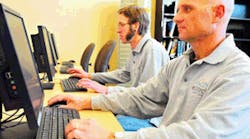In July 2010, Ecotech Institute, the first and only college entirely focused on education and training in renewable energy and sustainable design, opened its doors to students. A division of Education Corp. of America, Birmingham, Ala., the college offers six technical programs, including electrical engineering technology, energy efficiency, environmental technology, renewable energy technology, solar energy technology, and wind energy technology (see Ecotech Institute Programs Up Close). At the completion of each two-year, 96-hour credit program, students receive an Associate of Applied Science degree.
The institute marks Education Corp. of America’s first foray into technical education. “What it found is that there’s really a big need in the renewable energy field for technicians who are going to install, operate, and maintain equipment in the renewable energy field,” says Glenn Wilson, dean of students. “There’s been a really large growth in the jobs in that sector.”
With a degree from the institute, graduates should be able to get work as an installer of renewable energy and energy-efficient systems, but they can also work in the green manufacturing industry. “They certainly could get the [North American Board of Certified Energy Practitioners] NABCEP or the [Underwriters Laboratories, Inc.] UL certifications and work as an installer,” says Wilson. “The degree prepares them to do not only that, but they could also work in manufacturing as a high-level maintenance technician.”
Somewhere between construction and engineering is how Wilson describes the unique curriculum at the institute. “Our students experience some lecture, but we focus on giving them as much hands-on experience as possible,” he says. “They learn what an engineer might learn, such as control theory and digital and analog control, but the programs also teach them how to apply what they’re learning. They’ll have a really broad-based education on energy and the whole renewable field.”
Second careers
Currently, almost 200 students are enrolled in the technical college. The institute’s goal is eventually to attract around 1,000. Some of the students have arrived straight out of high school. “They’re excited about doing something in the renewable energy field,” says Wilson.
There are non-traditional students as well. In this economy, people start looking to begin a second career in a different field that may offer more opportunities. “There are quite a few second-career students who have been in another industry that either no longer exists, or they just want to leave for whatever reason —so they’re trying to retrain themselves for a market that has a lot of job growth,” Wilson says. “They know to get a job in this sector requires some pretty good training.”
As a result, the Ecotech Institute campus is already fairly diverse. “We have students who range in age from 18 to into their 50s,” says Wilson, who is encouraged to see quite a few women enrolled in the programs too. “The number of women in manufacturing just continues to grow, and we’d like to see more of them involved in some of the maintenance and technical aspects as well,” Wilson says. “These are good jobs with good benefits, so a lot of women are seeing this as a good career path.”
Moreover, Wilson sees veterans of the electrical construction industry as good candidates for some of the programs. “It’s a good fit for people with a construction background who want to work not just installing, but also want to understand the theory,” he explains. “That’s why the program is geared toward a combination of hands-on labs and theory. It will allow them to maintain and troubleshoot equipment — not just install it.”
In fact, one of the institute’s newest students, according to Wilson, is the president of a local chapter of an electrical workers’ union. “He enrolled here because he wants to learn about the renewable industry and also controls theory,” Wilson says. “Certainly, a lot of people in electrical construction are seeing renewables as a growth area, and they want to understand the specifics.”
Admission to the technical college requires a high school degree. In addition, candidates must be able to pass a basic English and math skills test. Most of the programs include general education classes, such as composition, physical science, and algebra. “For some people, that’s going to be challenging.” Wilson says.
However, the institute offers tutoring before classes start for those students who haven’t been inside a classroom in quite some time. “A lot of people just need some refreshing,” Wilson continues. “We try to get them up to speed so when they enter school, they’re not behind.” Furthermore, students will also need the intellectual capacity to understand the subject of their program. “They’ll be studying some pretty sophisticated control systems,” Wilson concludes.
Students with electrical experience could move to the head of the class in certain cases. For example, they may be able to skip the classes on industrial wiring, 3-phase power, bus bars, and how to wire motors. “We would probably exempt them from those classes,” Wilson says.
Friendly climate
Although the institute sees multiple campuses as a real possibility, according to Wilson, the location in Aurora, Colo., is currently the only campus (see Ecotech Institute Campus). “We would like to have locations elsewhere,” Wilson says, noting that at this time there are no online courses either. “We see that as being a real possibility as demand continues to grow.”
However, the administration sees its location in Colorado as a natural match for the school. “The state has really good natural resources, good sun, good wind, and a lot of renewable activity going on here,” says Wilson.
In fact, Colorado currently ranks 9th in wind project installations by state, adding 178MW of wind power in 2009. Also that year, Colorado ranked 8th in installed wind capacity and 11th in wind resources. The state now ranks 3rd nationally for distributed solar PV capacity and 6th for its solar resources. It is also the location of the National Renewable Energy Lab (NREL).
In addition to the actual climate, the political climate is kind to renewable energy as well. In 2009, the Governor’s Energy Office (GEO), with funding from the U.S. Department of Energy (DOE) and Clean Energy Funds directed by the state legislature, spent more than $25.2 million, with 9%, or $2,268,000, directed to renewable energy and sustainability projects. The next year, the state legislature voted to increase the Renewable Energy Standard to a “Best in the West” 30% by 2020. The new law will create thousands of clean-energy jobs, further diversify Colorado’s overall energy portfolio, and lead to 100,000 solar rooftops over the next decade. “There’s a really good legislative climate for the renewable industry here,” Wilson concludes.
Ecotech Institute Programs Up Close
Aurora, Colo.-based Ecotech Institute, the first and only college in the United States entirely focused on education and training in renewable energy and sustainable design, offers six technical programs, including electrical engineering technology, energy efficiency, environmental technology, renewable energy technology, solar energy technology, and wind energy technology. At the completion of each two-year, 96-hour credit program, students receive an Associate of Applied Science degree. Following is a description of the programs that may be of interest to electrical contractors:
Electrical Engineering Technology: This program is designed to give graduates a solid grounding in the fundamentals of clean energy production and transmission while specializing in electrical engineering. State-of-the-art laboratories and facilities give students the opportunity to apply the theory they learn in real-world, hands-on situations. Students learn to apply electrical and electronic theory to design, build, repair, calibrate, and modify electrical components, circuitry, controls, and machinery and perform diagnostic electrical analysis. Classes cover topics such as AC and DC circuitry, safety techniques, power generation and transmission, analog and digital electronics, and electrical systems and controls.
“Electrical engineering technology is for someone who wants to work at maintaining equipment in the renewable energy sector,” says Glenn Wilson, dean of students. “They can work in any of the fields.”
The types of controls that are used in wind and solar energy systems, as well as manufacturing facilities for SCADA systems, are programmable logic controllers (PLCs). “So students get an education not just on wiring and construction, but they actually understand control theory and how to troubleshoot and maintain this type of sophisticated equipment,” he says.
Energy Efficiency: This program provides students with immersive and hands-on training that focuses on providing sustainable energy solutions. It will prepare graduates to analyze, operate, and control the systems and equipment that are used to create a suitable thermal environment used by a wide range of buildings and structures. Graduates will be able to analyze and recommend suitable renewable energy systems to not only meet the needs of the user but also to be environmentally sound.
The program teaches students how to analyze energy usage for residential and commercial buildings, recommend sustainable energy solutions for high-consumption structures, and recognize and correct inefficient building energy systems. It provides an understanding of the basics of energy-efficient hot water systems and photovoltaic (PV) and solar energy. “We teach the students in this program the best way to help the energy industry is to not need as much in the first place,” Wilson says. “After you’ve done that, then a lot of facilities want to look at augmenting that with renewable energy. But the focus on energy efficiency is what can you do in a residential, industrial, or a commercial application to reduce waste and optimize those systems.”
Renewable Energy Technology: This program focuses on the engineering behind current and emerging technology. Each class in the curriculum is designed to give graduates a solid grounding in the fundamentals of energy generation and transmission while also providing them with a broad background in engineering technology. Graduates will be prepared to become engineering technicians with expertise across a broad range of renewable energy technology. Students learn how to apply theory and principles of engineering technology in the real world and to perform diagnostic analysis. They will also learn to meet industry and regulatory operating and safety standards within the engineering technology field.
Solar Energy Technology: This program prepares graduates for a career in the field of renewable energy with a key focus on solar energy technology. Students receive a solid grounding in the fundamentals of the production and transmission of clean energy using the radiation provided by the sun. State-of-the-art laboratories and facilities give them the opportunity to directly apply to the real world the theory they are learning. Typical jobs might include construction, installing or repairing solar energy systems, or working with architects or engineers as they design and install solar projects. Students learn to operate, troubleshoot, maintain, and repair PV equipment, including how to perform maintenance, repair, or replace parts to correct problems. Graduates will be able to perform diagnostic analysis and meet industry standards within the rapidly expanding solar energy field.
“After students learn about all the components of a solar installation, then they go outside to some buildings on campus and actually install solar panels,” says Wilson. “They do all of the wiring, so by the time they graduate from the solar program, they’ve had some experience in hands-on wiring and installation of panels and components of a solar system.”
Wind Energy Technology: This program prepares graduates for careers in the field of renewable energy with a strong focus on wind energy technology. The program will give graduates a solid grounding in fundamentals while specializing in the generation and transmission of energy using wind power technology. State-of-the-art laboratories and facilities give them the opportunity to apply in the real world the theory they learn in class. Graduates will be prepared to become wind energy technicians.
Students learn how to evaluate new turbines and their readiness for operation and resolve early stage electrical and mechanical faults. They also prepare to operate, troubleshoot, maintain, and repair a wind turbine operation, including complicated mechanical and electrical problems on variable-pitch, variable-speed turbines. They are trained to perform mechanical, hydraulic, and electrical component maintenance, repair, or replacement of parts to correct problems while meeting industry standards within the wind energy field.
“In addition, graduates will understand the large picture of the wind industry,” says Wilson. “We give them a good education on costs, financing, and rebates. All of those aspects of the renewable field they need to be able to justify projects before they’re installed, so students get some classes in energy management and the financial part of the business as well.”
Ecotech Institute Campus
Before it even opened its doors to students to study energy efficiency and renewable energy this past summer, Ecotech Institute transformed a vacant commercial building into a cutting-edge training facility that incorporates energy and resource savings throughout. The Ecotech Institute campus in Aurora, Colo., includes labs and classroom facilities that include many sustainable components.
Ecotech has invested heavily in renewable technologies. All told, the campus will get more than 5% of its peak load electricity from these wind and solar sources. All together, the renewable energy sources at Ecotech will generate more than 65,000kWh of electricity annually. Renewable energy components of the school include:
- 12 polycrystalline rooftop photovoltaic (PV) panels with a
system capacity of 2.8kW. - Integral thin solar technologies embedded into the glass front
building canopy with a system capacity of 9.4kW. - Eight small, building-mounted wind turbines mounted on the
roof will generate up to 4.8kW of electricity. - A wind turbine mounted in front of the building with a total
capacity of 4kW. - Two solar trees, each providing 16.9kW, will generate more than
50,000kWh per year of electricity.
Energy-efficient lighting will reduce lighting energy consumption by 30% below standard lighting energy levels. Some of the methods of limiting the amount of energy used by lighting on campus include:
- Motion sensors combined with a programmed lighting schedule.
- Classroom and office lighting incorporate step-dimming options.
A measurement and verification system will provide real-time monitoring of the campus power, natural gas, and water consumption. This information will be displayed in the lobby for visitor knowledge but will also be recorded and used to determine further energy-saving possibilities in the future. Finally, the campus will include four electric vehicle charging stations, capable of delivering a full vehicle charge in two to four hours.





